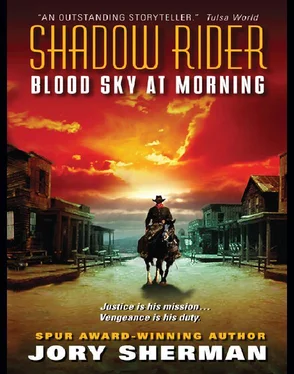Then the night would come, and he would find out if words would work better than bullets.
Chapter 16
Colleen fanned herself as she faced the class of Chiricahua children and their mothers. She had a large chalkboard to work with, and some children were forced to share their slates with those who had none. It was cooler in the adobe room than outside but still unbearably hot, and she felt the uncomfortable seep of perspiration under her armpits, on the inside of her legs, and beneath her breasts.
She used pictographs to illustrate the English words while she voiced the equivalent in their language, Apache.
“Ndeen,’” she said. Man. The children laughed at her stick figures, and sometimes the women did, too.
She taught them to count to five in English, using her fingers.
“Dalaa, naki, taagi,’” she would say. One, two, three.
Some of the words were difficult to say, and the children would correct her. Or if they were not sure, one of the mothers would speak up in a loud, gravelly voice and correct her pronunciation.
Colleen had an interpreter, a small, moon-faced woman named Tu Litsog, or Yellow Water. She relied on Yellow Water to convey her teachings.
“The key to language,” she said, “is writing. If you make the marks on paper, others can read it. You can send this paper, or carry it, over long distances so that others will know your words.”
The children and the women all had pieces of paper and pencils. They all seemed fascinated with the process, and though some made drawings or just meaningless scrawls, by the second day Colleen had them writing down the letters of simple words, like dog, cat, and bird. She was delighted at the response.
“I may be going away, Yellow Water, so do you think you can teach your people to read and write with the materials I will leave with you?”
“I do not know,” Yellow Water said.
“They all want to learn.”
“I know. They respect the white lady. To them, I am a…a turn cloth.”
“A turncoat? A traitor?”
“Yes, that is the word. A turncoat, a turn face, I think.”
“You must not let that matter. You must teach these children and their mothers. I will return.”
“Where do you go?”
“I must find my brother,” Colleen said.
There was always a soldier guarding the door, usually a private or a corporal, but a grizzled old sergeant often stopped by to check on the trooper and Colleen. She noticed him and liked him. He seemed to like her as well.
His name was Francis Xavier Toole, and he had been in the army for almost thirty years.
“Francis,” she said to him after they had become friends, “why is it necessary to put a guard on these children and women?”
“Oh, ma’am, the guard is not here to watch over the squaws and kiddies, oh no. Major Willoughby has the lads keepin’ an eye on yourself.”
“On me? Why?”
Toole shrugged, but she knew it was not because he didn’t know.
“Be honest with me, Francis,” she said. “Why does Major Willoughby think that I need an armed soldier watching me teach children to read and write English?”
“Well, mum, it’s not for me to say.” He shifted his feet and looked down at them, much like a truant boy might behave when speaking to an inquisitive teacher.
Something was wrong at Fort Bowie—she had known it from the very first day—and when news of her brother’s abduction became known to her, and Willoughby or anyone else would not tell her anything, she began to feel shut out. Now, after four days of talking with Toole and asking questions of him, she knew he was struggling with his obligation to the military and his friendship with her. But she was determined to persist.
“Francis, I know you’re bound by duty, but I must find out what’s happened to my brother. And, somehow, I think Major Willoughby knows more than he’s telling. This fort seems to be divided and without a real leader.”
“Yes’m,” Toole said, shuffling his feet and staring down at them, feeling awkward, and perhaps, she thought, a little ashamed.
“Are you agreeing with me, Francis? Or just being polite?”
“Both, maybe. Major Willoughby is temporary commander of the post, ma’am.”
“Until when?”
“I don’t know, ma’am.”
“But you know he’s doing things he should not be doing.”
“Ma’am, I’m not privileged to read the major’s mind.”
“Is he doing anything about finding my brother, Lieutenant Ted O’Hara?”
“I don’t know, ma’am.”
“Will you please call me Colleen and don’t be so stiff and formal with me, Francis.”
“Yes’m.”
“There you go,” she said. “Being polite and proper. And you, with so much wisdom, so much information inside you. Information I may need. As a friend.”
She was pressing Francis, she knew. Her face glowed in the wash of the afternoon sunlight, her cheeks painted in soft pastels with the complexion of peaches, her eyes narrowed to block the glare of the sun. Francis looked at her, his lips quivering as if he were boiling over to speak, to divulge what he knew, what he suspected.
“There’s only so much I can say, Colleen. Only so much I really know.”
“Anything might help,” she said. “In either category.”
“You mean you want me to speculate?”
“That would be a welcome change from the silence, Francis.”
“You push real hard, Colleen. I’ve seen mules less stubborn. Not to compare you to a mule, mind you…”
“Let’s not just chat with one another, Francis.”
“Well, um, they’s some soldiers what want the Apaches done in with. Rubbed out. Same as in town, over to Tucson. Your brother was sent out to locate hostiles, er, I mean, Apaches, and report back to Major Willoughby. I reckon I can speculate that the major might have a reason to do this.”
“Yes. I can follow you.”
“The major can’t do this right out in the open. We’re supposed to keep the peace, protect the citizenry of the territory, and help Mr. Jeffords bring Cochise and all the Chiricahuas to the peace table.”
“But Willoughby doesn’t want this to happen?” she said.
“I don’t rightly know.”
“Yes, you do. What about my brother? Why was he kidnapped and where was he taken?”
“I figure that faction in Tucson, them men, er, ah, those men, don’t want Cochise to get off scot-free. They want him and all the other Apaches made into good Apaches.”
“What does that mean?”
“It means dead, Colleen. A good Apache, they say, is a dead Apache.”
“And my brother? Was he taken away so that the people in Tucson could kill Cochise? Could murder Apaches?”
“Maybe.”
“And who was behind his kidnapping?”
“Same outfit that brung you—I mean brought you—here to Fort Bowie,” he said.
“Hiram Ferguson?”
“Yes’m. I reckon.”
“You know, you mean.”
“My best guess,” he said.
“I’m going there,” she said.
“Going where?”
“To Hiram Ferguson’s. I want to ask him what he did with Ted.”
“That could be dangerous, Miss Colleen. Ferguson is one of them drum beaters what wants to wipe out the whole Apache nation. He’s got him almost a regular army, I hear tell.”
“I’m not afraid of him.” But her dimples twittered silently like little bird mouths, quivering at the edge of her nervous, brave smile.
“You can’t do nothing, even if Ferguson is behind your brother’s kidnap. I mean he won’t tell you nothin’. And them layabouts he hires on would just as soon kill you as look at you.”
“Will you help me, Francis?”
“Help you? How?”
Читать дальше












